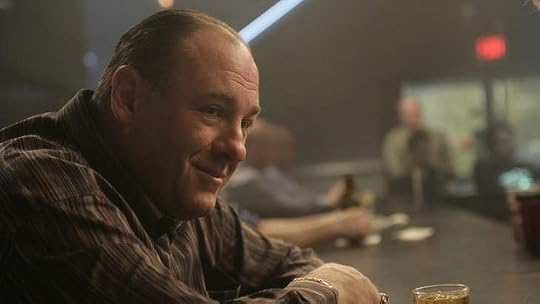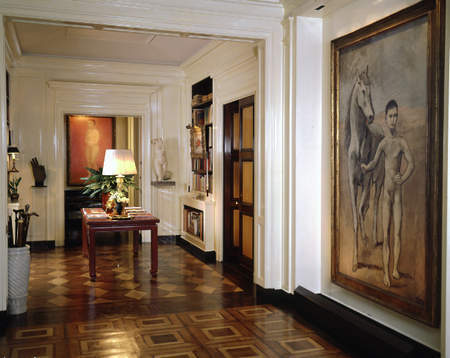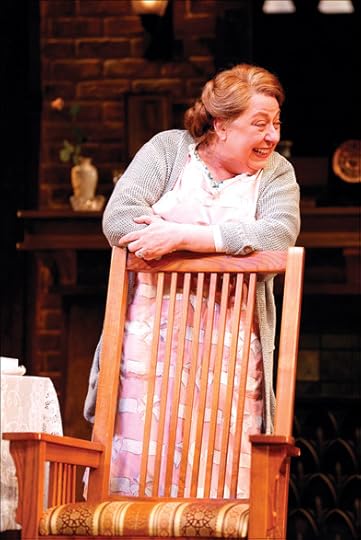Terry Teachout's Blog, page 74
June 24, 2013
TT: Almanac
George Orwell, "The Freedom of the Press"
June 23, 2013
TT: Just because
(This is the latest in a series of arts-related videos that appear in this space each Monday and Wednesday.)
TT: Almanac
George Orwell, "Looking Back on the Spanish War"
June 21, 2013
TT: The show that made series TV serious
* * *
What a difference a decade makes. Not long after James Gandolfini's death was announced on Wednesday, a friend of mine broke the news to his 22-year-old son and learned that the young man had never heard of the erstwhile star of "The Sopranos," David Chase's celebrated cable-television series about Tony Soprano, a likable but pathologically violent New Jersey mob boss. My friend was astonished. He shouldn't have been. Most millennials, after all, live in the present-tense world of pop culture, in which nothing matters that happened before they were 12. The heyday of "The Sopranos," which ran on HBO from 1999 to 2006, predates the dawn of their cultural consciousness. For them TV drama is "Breaking Bad" and "Mad Men." "The Sopranos" is...well, history.
If millennials took anything more than casual note of Mr. Gandolfini's demise, my guess is that they were amused by how it demonstrated the extent to which their baby-boom parents continue to believe that the world revolves around their personal preferences. What the boomers wrote about Mr. Gandolfini during the past 72 hours was as overstated as what they wrote about "The Sopranos" when it was new....

All that said, I think it likely that "The Sopranos" will be remembered, if not necessarily watched, for many years to come. It was, after all, a turning point in the history of small-screen drama, the very first television series that was incontestably superior in artistic quality to the vast majority of contemporary Hollywood movies. My own entry in the Great "Sopranos" Hyperbole Invitational was a 2000 essay in which I declared that "'The Sopranos' makes most 'serious' Hollywood movies look thin and tepid." It was true then, and it's true now. The difference is that there are now numerous other series of which the same thing could be said. The torch of seriousness has passed from film to TV, and Mr. Chase and his collaborators deserve full credit for causing that to happen.
Part of what made "The Sopranos" so powerful was the absolute self-assurance with which it fused drama and farce. The premise of the show--a mobster, overwhelmed by depression, enters psychotherapy in order to become a more effective crook--was purposefully funny, as was the overall tone of many of the episodes, which frequently veered in the direction of domestic comedy. But Tony never hesitated to kill or maim anybody who got in his way, and his penchant for violence was portrayed so graphically as to make it hard to laugh off. The jarring contrast between the two sides of his personality was the engine that drove "The Sopranos."
In addition, no small amount of the show's effectiveness arose from the way in which it used satire as a cunning way of sneaking in what proved on closer inspection to be an unexpectedly traditional view of American culture....
* * *
Read the whole thing here .
My favorite scene from The Sopranos:
June 20, 2013
TT: Almanac
Patrick O'Brian, The Ionian Mission
TT: A Picasso in the office
* * *
Several of the finest paintings owned by New York's Museum of Modern Art, including Pablo Picasso's "Boy Leading a Horse" (1905-06) and Henri Matisse's "Odalisque with a Tambourine" (1925-26), won't be there for the next few months. Right now they're in Maine, where "The William S. Paley Collection: A Taste for Modernism" is on view at the Portland Museum of Art. The show, which was first seen at San Francisco's de Young Museum and will be traveling to Quebec's Musée National des Beaux-Arts and the Crystal Bridges Museum of American Art, consists of 61 paintings, sculptures and works on paper drawn from the personal collection of the man who ran CBS from 1928 until a few years before his death in 1990.
Most people knew Bill Paley as a giant of radio and TV, but in the rarefied world of art he was also universally known as a passionate advocate of European modernism. He left his collection to MoMA, which put it on display in 1992 and has now sent it on tour. In addition to six works by Matisse and eight by Picasso, "A Taste for Modernism" contains major pieces by Bonnard, Braque, Cézanne, Degas, Gauguin, Gris, Manet, Miró and Renoir--a lineup that is spectacular by any standard.
 Part of what makes his collection so fascinating is that it really was his collection, not an exercise in corporate window-dressing owned by an investment-conscious CEO who leaves the chore of picking his paintings to a professional consultant. No sooner did Paley discover modern art in the '30s than he decided that he wanted "to surround myself with this kind of painting," and that was what he did. Part of his collection was hung on the walls of his Fifth Avenue apartment and part of it in his office at CBS, where visitors were invariably stunned to see top-tier masterpieces by Picasso, Giacometti and Toulouse-Lautrec.
Part of what makes his collection so fascinating is that it really was his collection, not an exercise in corporate window-dressing owned by an investment-conscious CEO who leaves the chore of picking his paintings to a professional consultant. No sooner did Paley discover modern art in the '30s than he decided that he wanted "to surround myself with this kind of painting," and that was what he did. Part of his collection was hung on the walls of his Fifth Avenue apartment and part of it in his office at CBS, where visitors were invariably stunned to see top-tier masterpieces by Picasso, Giacometti and Toulouse-Lautrec.The only thing missing from the show and its excellent catalogue is a discussion of how Paley's private life as an art collector intersected with his public life as a broadcasting pioneer. Almost a quarter-century after his death, it's easy to forget that he was a businessman first and foremost, the son of a cigar manufacturer who got interested in radio because he thought it would be a good way to sell his father's product. And while he contrived to turn himself into a cultivated gentleman, he made his own money from pop culture, some of it wonderful (it was Paley who first put Bing Crosby and Duke Ellington on network radio) and much of it brainless....
* * *
Read the whole thing here .
TT: All talk, no walk
* * *
"The Show-Off," George Kelly's 1924 tale of a genial, fraudulent blowhard and the mother-in-law who despises him, used to be one of America's best-loved comedies. It's been done six times on Broadway and filmed three times in Hollywood, most famously with Spencer Tracy playing the title role. But just as Kelly himself is no longer remembered save as the uncle of Grace Kelly, so has "The Show-Off" come over time to be seen as an amiable but slight period piece. The Roundabout Theatre Company's 1992 revival closed after just five weeks, and since then high-profile stagings have been scarce to the point of near-nonexistence. All praise, then, to Westport Country Playhouse for mounting a revival of "The Show-Off" directed by Nicholas Martin ("Vanya and Sonya and Masha and Spike") that leaves no doubt of the play's enduring excellence, simultaneously giving Jayne Houdyshell yet another opportunity to demonstrate that she's the best of all possible character actors.
 Never having seen "The Show-Off," I took for granted from what I'd read about the play that it was an old-fashioned domestic comedy noteworthy only for being good of its kind. It is, in fact, a dark, sometimes startlingly harsh character study of Aubrey Piper (Will Rogers), a ne'er-do-well railroad clerk who brags endlessly about his made-up achievements in order to cover up his own sense of failure. Not at all surprisingly, Mrs. Fisher (Ms. Houdyshell), the hard-headed mother of Amy (Clea Alsip), Aubrey's fiancée, sees through his rodomontade and dismisses him with the cold-eyed cruelty of a working-class Irishwoman who shed her last illusions long ago....
Never having seen "The Show-Off," I took for granted from what I'd read about the play that it was an old-fashioned domestic comedy noteworthy only for being good of its kind. It is, in fact, a dark, sometimes startlingly harsh character study of Aubrey Piper (Will Rogers), a ne'er-do-well railroad clerk who brags endlessly about his made-up achievements in order to cover up his own sense of failure. Not at all surprisingly, Mrs. Fisher (Ms. Houdyshell), the hard-headed mother of Amy (Clea Alsip), Aubrey's fiancée, sees through his rodomontade and dismisses him with the cold-eyed cruelty of a working-class Irishwoman who shed her last illusions long ago....Ms. Houdyshell's performance is cold, hard and relentless--you can see how pleased she is by the prospect of seeing Aubrey get his final comeuppance--and most of her fellow cast members give equally believable performances that root the humor of "The Show-Off" in real, closely observed life.
Mr. Martin has been known on occasion to go in for too-easy exaggeration. This predilection may help to explain Mr. Rogers' acting, which is anachronistically goofy (he reminded me of Bill Murray) in a way that works on its own terms but nevertheless seems out of tune both with the play itself and with the rest of the staging....
The Public Theater has kicked off this year's Shakespeare in the Park season with a sure thing, a pratfall-intensive version of "The Comedy of Errors" in which Daniel Sullivan turns Shakespeare's shortest, silliest play into a splendidly festive romp staged in the hectic manner of a Warner Bros. swing-era film farce. Hamish Linklater and Jesse Tyler Ferguson (who is well on the way to becoming one of our top Shakespearean clowns) are in charge of the lunacy...
"The Two-Character Play," first performed in its present form in 1975 and rarely seen thereafter, is about a pair of broken-down actors (Brad Dourif and Amanda Plummer) who are touring the provinces in a play called "The Two-Character Play" in which they are cast as a pair of broken-down hermits who can't get up the nerve to kill themselves. The results are so full of half-digested, pseudo-poetic theater-of-the-absurd burble ("And, oh, God, the air isn't cold like ordinary cold but like the sort of cold there must be at the far, the farthest, the go-no-more last edge of space!") as to suggest a parody of Williams written by Edward Albee, or maybe vice versa....
* * *
Read the whole thing here .
June 19, 2013
TT: Almanac
Patrick O'Brian, The Surgeon's Mate
TT: So you want to see a show?
Here's my list of recommended Broadway, off-Broadway, and out-of-town shows, updated weekly. In all cases, I gave these shows favorable reviews (if sometimes qualifiedly so) in The Wall Street Journal when they opened. For more information, click on the title.
BROADWAY:
• Annie (musical, G, some performances sold out last week, reviewed here)
• Matilda (musical, G, all performances sold out last week, reviewed here)
• The Nance (play with music, PG-13, closes Aug. 11, some performances sold out last week, reviewed here)
• Once (musical, G/PG-13, most performances sold out last week, reviewed here)
• The Trip to Bountiful (drama, G, closes Sept. 1, reviewed here)
• Vanya and Sonia and Masha and Spike (comedy, PG-13, remounting of off-Broadway production, closes Aug. 25, most performances sold out last week, original production reviewed here)
OFF BROADWAY:
• Avenue Q (musical, R, adult subject matter and one show-stopping scene of puppet-on-puppet sex, reviewed here)
• The Fantasticks (musical, G, suitable for children capable of enjoying a love story, reviewed here)
• The Weir (drama, PG-13, closes Aug. 4, reviewed here)
CLOSING SOON IN WASHINGTON, D.C:
• The Real THing (drama, PG-13, adult subject matter, closes July 7, reviewed here)
CLOSING SOON OFF BROADWAY:
• Far From Heaven (musical, PG-13, adult subject matter, closes July 7, reviewed here)
CLOSING NEXT WEEK IN ARLINGTON, VA.:
• Company (musical, PG-13, adult subject matter, closes June 30, reviewed here)
CLOSING NEXT WEEK IN RED BANK, N.J.:
• Present Laughter (comedy, PG-13, adult subject matter, closes June 30, reviewed here)
CLOSING SUNDAY OFF BROADWAY:
• The Caucasian Chalk Circle (drama with music, PG-13, reviewed here)
• 3 Kinds of Exile (drama with music, PG-13, reviewed here)
June 18, 2013
TT: Snapshot
(This is the latest in a series of arts-related videos that appear in this space each Monday and Wednesday.)
Terry Teachout's Blog
- Terry Teachout's profile
- 45 followers



